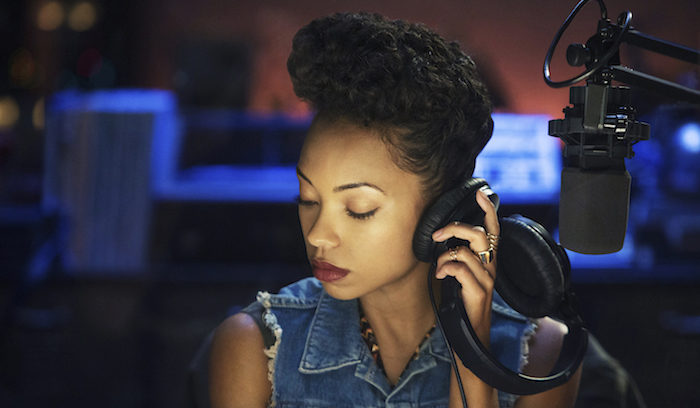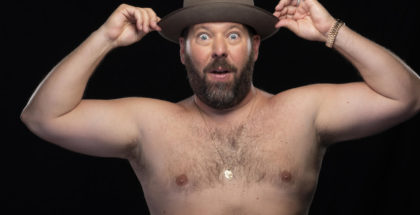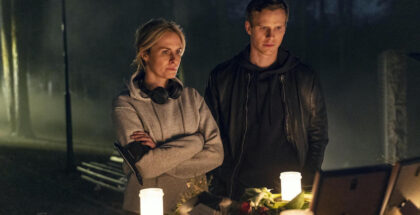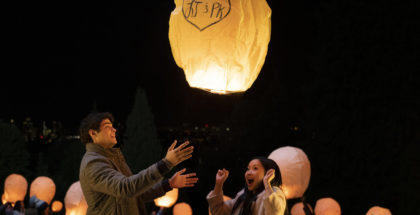Why should you be watching Dear White People on Netflix
Leslie Byron Pitt | On 04, May 2018
Netflix’s Dear White People opens with a James Baldwin quote: “The paradox of education is that as one begins to become conscious, one begins to examine the society in which he is being educated.”
Amusingly, it’s little surprise that the first people to complain about the show when it first reared its head in 2017 would bemoan the show simply due to its baiting title. Celebrity ignoramus and rent-a-gob Katie Hopkins questioned the adverts to the first series with a quickly pulled tweet: “If your lives matter why do you stab and shoot each other so much”.
A typical response from an individual whose income is generated by inciting controversy and division where possible, yet such moronic comments were easy to stumble upon by people who wouldn’t bother to open their eyes to even watch the first episode, let alone take on board what the show actually wants to say about race and identity politics. Sometimes uncomfortable, often laugh-out-loud funny, Dear White People is a richly formed mosaic of socio-political issues faced by modern American millennials. Without the restriction of a two-hour runtime, the show (based on Justin Simien’s feature film of the same name) allows some of its characters to breathe a little easier while giving deeper exploration of the topics raised by the movie previously. Unlike the Hopkinses of the world, it has a desire to examine society, open up a dialogue and educate.
The show starts at the immediate aftermath of the film’s Blackface Halloween Party, with each of the main characters not only dealing with the ugly hungover of not only the party taking place but also the mini-riot and injustices that follow. The blackface party was a protest to the provocative radio show hosted by main character Sam (Logan Browning); the mixed race, natural haired woke film major, who recorded the event in its entirety. Sam is the most vocal about racial discord that flows through the predominantly white college. However, it’s difficult to be the “woke” black girl on campus when your current bae, Gabe, is as white as a Starbucks queue in Philadelphia.
From then on, the show wisely breaks off into different chapters, focusing on one character of the ensemble cast at a time, each with a different slice of the social justice pie to tuck into. Troy is the “appropriate” black face of the college, running for student president, while trying to escape the clutches of his demanding father. Lionel is the journalism major, who is looking to find his place in the world as a gay, black nerd, who is maybe too thin-skinned for his chosen profession. Before finding his voice, however, he must navigate his feelings about Troy, his straight roommate. Coco is the dark-skinned “trophy” girlfriend of Troy, who’s seemingly doing her best to repress her feelings of displacement, as well as her smarts, in exchange for the man on her arm and a good-looking weave. Meanwhile, Reggie struggles with pushing the pro-black message when an ill-advised debate reaches boiling point. Gabe, the most prominent white guy in a sea of colour begins to feel the conflict that occurs when dating someone who is not of the same shade as himself. These are just a glimpse of the thoughts, feelings, and issues that reside with the characters, as the show slowly rises to a crisis point involving armed police on campus, identity politics as a whole and the underhanded acts of college funding itself, and it’s all gift-wrapped with delectable narration by Giancarlo Esposito (Breaking Bad).
We are reaching a golden age of black television, which is not only engaging and socially conscious but arriving at a maturity at a time when it is needed most. Shows such as Insecure, She’s Gotta Have It, Blackish, Luke Cage, and Atlanta are obtaining acclaim and viewership at a time in which America is witnessing one of the most dishonourable presidents in recent history perform tragically on issues of race within the country, as well as the fall of popular celebrities such as Bill Cosby, Kanye West and R Kelly. The beauty of the fragmentation of media and release of such shows is how they are highlighting black identity, not within monolithic stereotypes and paradigms of previous works (particularly when we consider the representation of the aforementioned stars), but rich, layered storytelling. This is a show which tells intertwining narratives from various different viewpoints and socio-political standings and often does so within 22 minutes. The amount it references in a small space of time is quite impressive. The very first episode’s final speech is still deeply passionate a year later, as Season 2 arrives, when there is a feeling in some quarters that real life has just got worse.
The pop culture history is as deep as it is varied. It’s possibly not a coincidence that Logan Browning, who takes over from Tessa Thompson as Sam from the movie, bares a small resemblance to Trisha Campbell, who appeared in Spike Lee’s School Daze (1988). An argument told in flashback midway through the series harks back to the similar issues raised in Lee’s film, albeit now upgraded for the new millennium. The show makes gentle pokes of fun at the likes of European Arthouse and Shonda Rhimes’ Scandal, while the assortment of intertwining plot lines that build to its protest crescendo certainly reminds us of Lee’s Do the Right Thing (1989), which is neatly referenced in between debates on David Lynch’s rightful status in film canon.
Comedian and writer Dana Gould noted in one of his recent podcast episodes: “Films have a way of reflecting the social climate of which they are made.”
This was more about the sci-fi monster movies of his youth, and yet the comment applies to this show. Dear White People’s strengths lay with just how well it notes the social agendas currently at play. The fractured, sometimes divisive, labelling of people within a culture. The inability of being 100%, because of one’s own individual blind spots. The problematic nature of today’s hashtag activism and making people merely aware of an issue. The show grants it’s main characters an autonomy that the culture felt had been missing from so much media that’s come before it. In addition to this, much like the aforementioned Insecure and She’s Gotta Have it, this is another black-led show that feels sexually liberated. This is not to say that the sex scenes are particularly titillating, but it is a show that is unafraid to show black skin and physique as something to be desired in the forefront. Something that is also slowly becoming less of shock in mainstream culture.
It’s no surprise that the show’s strongest episodes are directed by Simien, as well as Oscar-winning director Barry Jenkins, and that it begins to lose steam after Jerkins’ most emotionally fraught episode involving police violence. While the build-up to the incident may feel a little hard to swallow, the event itself is still so troubling and relevant that the rest of the show struggles to beat it. However, much like so many aspects of Dear White People, it highlights the show as the type of risk-taking project Netflix seems more than willing to take on. With Season 2 out now, one can only hope that it gains enough traction to ensure it doesn’t go the way of The Getdown. One can only hope.
Dear White People Season 1 and 2 is available on Netflix UK, as part of an £9.99 monthly subscription.





















